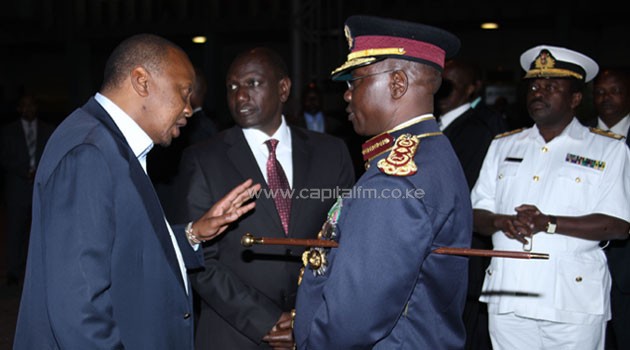
The President is understood to be concerned about the increased banditry attacks in the area where 23 police officers have been killed in just two weeks, raising concerns on the capacity of the country’s security forces. CFM/File.
A State House official said the president will be accompanied by top security chiefs from the military and police as well as the Interior Cabinet Secretary Joseph Ole Lenku to assess the situation.
He had been expected to attend a thanks giving prayer service for disciplined service officers and their families at the Holy Family Basilica, Nairobi, but officials said he will first visit Kapedo.
The President is understood to be concerned about the increased banditry attacks in the area where 23 police officers have been killed in just two weeks, raising concerns on the capacity of the country’s security forces.
Bodies of eight of the officers killed by bandits were recovered on Saturday morning, before 12 others who had gone missing after the attack were recovered later in the evening.
Reports from Turkana indicate that most of those killed are GSU officers who were ambushed while pursuing raiders in the volatile region of Kapedo, where five other people, including three police officers were killed and their vehicle burnt while escorting examination materials.
“The officers engaged the bandits in a fire fight that resulted in the death of eight police officers and 2 civilians. Twelve others are missing and feared dead,” Police Spokesman Masoud Mwinyi said in a statement.
A senior police officer based in Turkana later told Capital FM News that they had confirmed the deaths of the 12 officers, raising the death toll of police officers to 20.
Mwinyi said a major security operation—led by Interior Cabinet Secretary Joseph Ole Lenku and police chief David Kimaiyo—had been launched to recover the bodies of the slain officers as well hunt down the attackers who were said to be heavily armed after snatching firearms from the officers.
Tension was reported to be high on the ground despite the heavy security deployment.
Already three leaders from the region have been charged in court over incitement leading to killings of five people in Kapedo. Those charged include Baringo County Assembly Speaker Kassait Kamket and two county assembly members who denied the charges saying they are politically motivated.
The incident came hours after President Uhuru Kenyatta outlined his security agenda for the country on Friday when he opened a high level seminar on national security in Nairobi.
In a 10-point statement that defines his vision for the country’s security, President Kenyatta laid down the steps towards guarding against security threats, protecting the nation’s sovereignty and driving its development agenda.
He said the government’s job was to build a strong State whose actions will be guided and constrained by the spirit and letter of the country’s democratic Constitution.
President Kenyatta singled out the State’s monopoly of violence, saying the disciplined services must become the only actors with the legitimacy to use force.
“They must be ready, willing and able to secure the persons and property of all citizens. This is a key dimension of national security,” President Kenyatta said.
He cited effective administrative control, saying it will ensure the reach of government authority over the territory of Kenya.
He emphasised the need for prudence in public finances, noting that no State can be sovereign while it relies on external sources to fund its operations.
“Fortunately, Kenya is not in this position, but a large section of the most vocal civil society is hopelessly dependent on foreign funding, particularly from governments with interests that may conflict with our national security,” he said.
President Kenyatta stressed the need to invest in human capital. Failure to invest in the livelihoods of the country’s youth, he said, directly threatened national security.









































